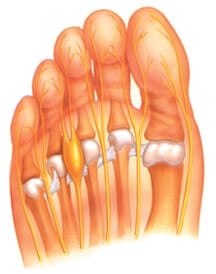Morton’s neuroma

Morton’s neuroma
How to relieve Morton’s neuroma
 Morton’s neuroma is a type of benign growth of nerve tissue that presents on the foot. It usually develops between the the third and fourth toes. A nerve tumor can be quite painful.
Morton’s neuroma is a type of benign growth of nerve tissue that presents on the foot. It usually develops between the the third and fourth toes. A nerve tumor can be quite painful.
Other names for the condition are Morton’s metatarsalgia, Morton’s neuralgia, Morton nerve entrapment, Morton’s disease, plantar neuroma and intermetatarsal neuroma.
This type of growth occurs due to swollen nerves at the ball of the foot.
Quick facts on Morton’s neuroma
- While it is a growth of nerve tissue, they are not cancerous.
- As it develops, the afflicted will experience pain in the ball of the foot.
- Surgery is often very effective. However, it should only be performed when all other alternatives have been exhausted.
- It is not quite known how the growth develops, but some causes are known. These include wearing high heels or playing some sports.
Treatment
Morton’s neuroma often only require patients to change the type of footwear they are accustomed to. Additionally you can take painkillers, or receive steroid injections. Surgery is an effective treatment. Above all, it should only be considered if all other options have failed or are unable to help the patient.
Treatment is dependent on a few factors, such as:
- the severity of your symptoms
- how long these symptoms have been present
- whether other home remedies have been successful
Earlier diagnosis can lower the chance that surgical intervention will be necessary.
If the symptoms are too painful, then your podiatrist near me may suggest the following:
- Corticosteroid injections: These steroid injections can be helpful in reducing inflammation and pain, but only a small amount of injections are typically advised. They can have some nasty side-effects. Tissue atrophy and capsular weakness are two of them.
- Alcohol sclerosing injections: Alcohol injections can help reduce the size of the Morton’s neuromas. Secondly they help reduce pain. Typically, we need only 4-7 injections. We administer these about once every two weeks.
Morton’s neuroma surgery
When all else fails, surgery may be the only viable treatment option. Although, typically we consider this after symptoms have persisted for about a year.
The main drawback to surgery is that it may result in total numbness in the toes, which does not go away.
The surgery aims to remove either the involved nerve or the pressure on the nerve by making incisions on the ligament above it or fibrous tissue.
We commonly use two surgical approaches:
- Dorsal approach: This method involves a top-down approach, and can lead to a quicker recovery as the patient does not receive stitches on the load-bearing bottom of their foot.
- Plantar approach: This approach takes a bottom-up approach. It often requires that the patient take a recovery time of about 3 weeks. You must remain off of your feet by using crutches. The scarring that can come from this procedure can cause discomfort in the future. Although the incision is more precise and doesn’t require cutting of other parts of the foot.
There is a slight risk for infection on the toes following the surgery.
Symptoms of Morton’s Neuroma
The sensation caused by Morton’s neuroma can feel like a burning in the ball of the foot.
Areas affected can also experience numbness that goes away when you remove footwear and massage the foot.
With Morton’s neuroma, the tissues around the nerves leading to the toes swells, which causes the sharp, burning sensation in the ball of the foot.
Very seldom will there be an visible symptom, such as a lump, but, those signs that do occur will develop suddenly and will often worsen over time.
The primary symptom that appears is pain in the foot while bearing weight. Typically it appears after a short time walking, and can also present in adjacent sides of two toes.
Uncommonly, there can be a dull pain rather than a sharp pain, but normally whatever the pain, you feel it between the third and fourth toes.
Other symptoms can include:
- burning pain, typically described as if a red hot poker was pinching at the bottom of the foot while walking
- numbness in the toes
- Paresthesia, or a tingling numbness that doesn’t last
- a sensation that something is inside the ball of the foot
Most descriptions of the burning pain account that it starts at the ball of the foot then spreads to the toes.
Tighter footwear and more strenuous activities can make the symptoms appear more aggressively, and can make them last for longer periods of time, up to weeks at a time.
In rare cases, no symptoms may be present in a patient that has a Morton’s neuroma.
Cryosurgery for Neuromas
We were the only Podiatrist in Pittsburgh offering Cryosurgery for neuromas. Cryosurgery can help your body reabsorb the inflamed nerve sheath -giving you a “do over” and the body regrows a new nerve sheath without the existing scar tissue and with less pain sensors. This works 50-70% of the time and is worth trying before neuroma surgery, as this may have many complications. However, the technology became unsupportable when the manufacturer went out of business and consumable parts are unavailable.
When is surgery recommended for Morton’s neuroma, and what does it involve?
Surgery for Morton’s neuroma is typically considered when conservative treatments fail to provide relief from pain and discomfort, or when the neuroma has progressed to a severe or disabling stage. The decision to proceed with surgery is made on an individual basis after thorough evaluation by a healthcare provider. Here’s an overview of what Morton’s neuroma surgery involves:
Procedure:
The most common surgical procedure for Morton’s neuroma is called neurectomy or neuroma excision. During this surgery, the surgeon makes an incision on the top of the foot, near the affected area, and carefully locates the neuroma.
Neuroma Removal:
The surgeon then identifies the nerve affected by the neuroma and carefully removes the neuroma itself. This process involves cutting and removing the affected portion of the nerve. The goal is to alleviate the pressure and irritation causing the pain.
Nerve Management:
After removing the neuroma, the surgeon may either tie the two ends of the nerve together (nerve repair) or bury the nerve stump in nearby muscle tissue (nerve burial). This depends on the surgeon’s approach and the specific case.
Recovery: Following the surgery, the incision is closed, and the foot is typically bandaged. Patients may need to wear a surgical shoe or a protective boot during the initial recovery period. Full recovery can take several weeks to a few months, and physical therapy may be recommended to aid in rehabilitation.
Success: Morton’s neuroma surgery is generally considered successful in providing long-term relief from symptoms in most cases. However, as with any surgery, there are risks and potential complications, such as infection, scarring, or persistent numbness.
It’s essential to discuss the surgery’s risks, benefits, and expected outcomes with a qualified surgeon and make an informed decision based on your specific condition and needs.



